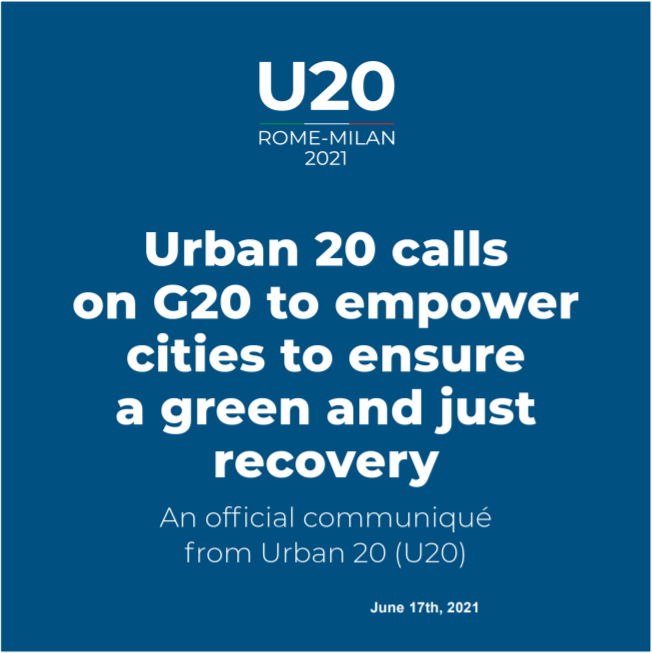U20 Communiqué establishes priorities closely aligned to library strengths
29 June 2021
Earlier this month, the communiqué of the Urban-20 summit – a meeting of mayors of leading cities around the world, in the context of the Italian G20 Presidency – was released.
 The fourth such meeting, this year the work is being coordinated by the mayors of Rome and Milan, with the support of international organisations for local and regional governments – C40 and United Cities and Local Government.
The fourth such meeting, this year the work is being coordinated by the mayors of Rome and Milan, with the support of international organisations for local and regional governments – C40 and United Cities and Local Government.
The fact that these meetings are being held underlines the relevance of the work of governments at all levels in achieving strong recovery and equitable growth in the wake of the COVID-19 pandemic.
So many key factors for success are determined by towns, cities and regions, rather than by national authorities, not least, of course the budgets and terms under which public libraries operate.
The communiqué marks a step forwards from previous such texts, organised into three overarching themes – people, planet, and prosperity – with five actions under each.
The communiqué will be submitted to heads of state and government when they meet at the G20 Summit in October. But it also contains plenty of useful references for libraries now, including in their work with local authorities.
Five actions in particular are relevant for libraries, representing areas where our institutions have a strong potential to contribute to success (if effectively integrated into strategies and programming), although it does not take much imagination to see connections elsewhere:
1) Universal and accessible public services to leave no-one behind: the communiqué stresses the need for everyone to be able to benefit from basic services which support education and wellbeing, without discrimination. With a mission to serve all members of the community, libraries are clearly a part of any meaningful action in this area.
2) Investing in cultural life: the communiqué underlines the importance of giving everyone the possibility to engage in cultural life, delivering on a core human right. As often the most ‘local’ of cultural institutions with a strong focus on access, this is very welcome for libraries, alongside the emphasis on ensuring that those cultural professionals affected negatively by the pandemic receive the support necessary to continue creating.
3) Adapting to the future of work through digital skills and lifelong learning: with skills and learning, in particular outside of formal education, often in the hands of local and regional governments, it is welcome to see a focus on how to provide opportunities to everyone to update and adapt their skills to an evolving labour market. Libraries can be both providers of such learning, as well as portals to offers by others, not least when it comes to developing digital literacy.
4) Strengthening local democracy: under this heading, the communiqué stresses the value of participation, both physically and online, the importance of access to data, and freedom of expression. It focuses in particular on providing access to decision-making spaces for people from under-represented groups. With an increasing focus on being a place for civic debate and engagement in many countries, libraries are well placed to participate in efforts to deliver on this action.
5) Protecting digital rights: in a very rich paragraph, the communiqué calls not only for work to ensure that digital giants are properly regulated, as well as to promote the ethical deployment of smart city technologies, but also to bridge the digital divide (explicitly understood as being about all of connectivity, devices and skills). This last point plays to a key strength of libraries in providing holistic solutions to digital exclusion.
We look forward to both the U20 Summit in September, and the G20 Summit in October, and encourage libraries globally to draw on the points set out in the U20 communiqué in their own advocacy.
See also our story on the initial U20 Italy announcement.